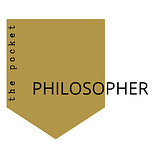Good morning fellow philosophers,
Today we begin a new week, looking at the theme of epistemology. Don’t feel bad if you’ve never heard of this word, it just means that you’re normal and didn’t waste…I mean spend…your college years studying philosophical definitions.
Seriously though, this is one of my favorite philosophical concepts and we’re going to have a lot of fun diving deep (at least I will, hoping it’s mutual).
Quick introduction, epistemology refers to theories of knowledge, or to put it plainly, how do we know what we (think) we know. So basically, we’re going to spend this next 5 days making you question even the most basic grasp you feel you have on reality. Sound good?
Every morning I write an email exploring life through the eyes of the world’s greatest thinkers. Sign up here if you would like to receive it directly in your inbox.
Synopsis: This [change] is a problem that Heraclitus calls flux. Flux refers to the notion that truly, all things hold on to a central identity, even as they change over time.
One of the best places to start a conversation on epistemology is with a few greek parables, one in particular about Theseus and his ship. If you remember, Corey Hobbs won our podcast competition last week wanted to learn more about the ancient story after hearing about it from Wandavision.
Like all good Marvel Universe stories, there is no shortage of philosophical and ethical references to be unraveled. I have to say though, Theseus and his ship feels pretty fringe philosophical knowledge, so I was stoked to dig in.
So let’s go back. Early greek philosophers were very excited to talk about things that changed, things that stayed the same, and the difference in between. It’s important to note that the thoughts we’re going to explore here have probably existed for tens of thousands of years, but what’s significant is the writing, compiling, and logical arrangement.
People have been creating myth and doing metaphysical thought experiments for as long as they could paint images on cave walls. But the organization and record keeping that was happening in the time of the early Greek philosophers especially is really important for all future civilizations (like us) to be able to build upon.
Today we’ll let Heraclitus set us up to understand Theseus’ Ship. He and his friends were obsessed with something called the problem of the one and the many.
Let’s approach this problem by thinking about a river. This was the basis for Heraclitus—an incredibly important Ephesian philosopher to whom even Plato would reference—as he began unravelling the universe. He said,
All things come into being through opposition, and all are in flux, like a river.
Later he writes
Upon those who step into the same rivers flow other and yet other waters.
Heraclitus was beginning to articulate and record for the first time the tension that exists between our logical, organizing, prediction making brains (go back to Friday’s letter for more on that) and the way things actually are.
It seems that the idea of a river only exists in our minds, because actually there are many waters flowing in and out of any given river, and what’s more, the water itself is constantly flowing along meaning that anytime you step in a river, you’re bound to encounter totally new waters the next time you return.
Plato said in reference to this problem,
“You cannot step twice into the same river.”1
Early in Greek philosophy we are challenged by our most basic ability to know things—what even is a river? Is it a location, is it the way certain water molecules are arranged in time, is it the canal carved by the water, is it still a river even if there is no water in it, say during a drought?
This is a problem that Heraclitus calls flux. Flux refers to the notion that truly, all things hold onto a central identity, even as they change over time. What’s trippy, is that Heraclitus wants to ascribe flux to all of reality.
“Well sure,” you might think, “flux makes sense for a river, but a not rock, or tree, or a human being.”
Astoundingly, Heraclitus stood upon this observation without any knowledge of the microscopic or atomic world. Take a moment to ponder how even you are in flux. By now, each cell of your body—each baby tooth and hair down to your skin cells—are completely different than those you had as a child. Science has observed that human cells are actually totally replaced every 7 years!
Plus, the neuroplasticity of your brain has carved new paths and your thought patters have changed over time, as have your relationships, where you live, what you talk about, how you speak…you get the idea.
So, if even you are in flux (at least every seven years), who are you? Are you just your memories organized? Could I just capture your memories, share them with someone or something else, and they would continue on living as you? If not, why not? (Short aside, other people in the world around the same time would start talking about something called the ego which is roughly the same concept at play.)
With this background of flux, we’re now ready to approach the problem of the Ship of Theseus. Roughly, it goes something like this. (For context, Theseus was a legendary Greek god/king, his name would have been universal and an easy target for a parable about identity, flux, and epistemology).
Theseus, on retiring from conquest, wanted to preserve and honor his ship that was used to conquer and rule Greece. So, he made for it a museum of sorts and put it on display. Over time the pieces of the ship would decay and need to be replaced—bolt by bold, plank my plank, ore by ore.
Over time, the keepers of the ship likewise preserved the old pieces in a garage out back. At some point, they now had Theseus’ ship on display, and one out back rotting but still in tact.
The question becomes, which ship is the Ship of Theseus? The one on display or the one out back?
For some it feels obvious to say, "it’s obviously the old one assembled in the garage.” But if that’s the case, are you your dead skin cells and old neuroplasticity, and not who you are right now?
For others they might say, “it’s clearly the ship that remains in the museum.” But if this is the case, does that mean you are simply the collection of your thoughts and memories?
As you can see, with one step back from our daily life we’re left with a serious problem and our very sense of self-knowledge is threatened. Like I mentioned earlier, this exercise produces a similar outcome as mindful religions like Hinduism which were wrestling with the same problem around the same time.
A few thousand years later, the Buddha and Jesus would likewise pick up the mantle, attempting to name the difference between the ego we identify with, and the deeper reality of our nature.
Wrapping this all up, what does this mean for technology and AI? If you interpret the parable of Theseus’ Ship to mean we are simply our memories and experienced housed and organized, what does this mean for our future? Are we years away from simply mimicking and capturing our memories in the cloud, so our egos can continue living forever after our physical end?
I hope you’v enjoyed peeling back the first layer of epistemology and identity together this morning. Please comment with your questions and discoveries, share with your friends who enjoy philosophy, and if you haven’t already, please subscribe to receive this in your inbox every morning!
Be well,
-TPP
References:
https://en.wiktionary.org/wiki/epistemology
https://www.inverse.com/entertainment/wandavision-just-changed-the-mcu-in-1-major-philosophical-way
https://science.howstuffworks.com/life/cellular-microscopic/does-body-really-replace-seven-years.htm#:~:text=According%20to%20researchers%2C%20the%20body,%3A%20Stanford%20University%2C%20Northrup%5D.
https://www.ancient.eu/Theseus/#:~:text=Theseus%20is%20a%20legendary%20hero,of%20the%20Cretan%20king%20Minos.
Image:
https://sites.google.com/site/basicgreekmythology/hero-s/theseus
The Great Conversation, Norman Melchert












